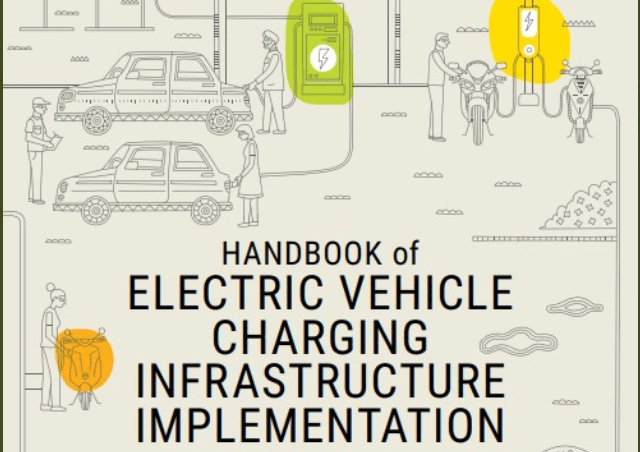
NITI Aayog released a handbook to guide state governments and local bodies to frame policies and norms towards setting up charging networks for electric vehicles (EV). The objective is to enhance charging infrastructure and facilitate a rapid transition to electric mobility in the country.
The Handbook for Electric Vehicle Charging Infrastructure Implementation has been jointly developed by NITI Aayog, Ministry of Power (MoP), Department of Science and Technology (DST), Bureau of Energy Efficiency (BEE), and World Resources Institute (WRI) India.
The Handbook provides a systematic and a holistic approach for adoptions by implementing authorities and other stakeholders involved in planning, authorisation and execution of EV charging infrastructure. It presents an overview of the technological and regulatory frameworks and governance structures needed to facilitate EV charging. It focuses on the present needs of charging infrastructure development while considering the evolving nature of the sector.
The transition to electric mobility is a global strategy in the fight against climate change, on which India has expressed ambitious aspirations. “The handbook addresses the common challenges being faced by different local authorities in implementing EV charging networks. It serves as a starting point for the peer-to-peer exchange of best practices between states and local bodies,” said Dr Rajiv Kumar, Vice Chairman, NITI Aayog.
“The EV ecosystem in India is evolving rapidly and there are several players entering the charging infrastructure market. This handbook provides holistic governance for public and private stakeholders to work together in establishing robust and accessible EV charging networks,” said, Mr Amitabh Kant, CEO, NITI Aayog.
EV charging is a new type of power demand for discoms, which play a pivotal role in providing seamless power supply connections for charging facilities and ensuring that the electrical distribution network has the requisite capacity to serve this demand. “The Ministry of Power and it’s Central Nodal Agency for the establishment of Charging Infrastructure for EVs in India i.e. the Bureau of Energy Efficiency (BEE), are working closely with DISCOMs and State agencies in overcoming barriers to charging infrastructure implementation, for which this handbook will be greatly helpful. With the rapidly growing share of renewables in the energy mix in the country, the benefits from transition towards e-mobility are only expected to become more significant in the coming years,” said Mr Alok Kumar, Secretary, Ministry of Power.
Unlike fossil fuel-powered vehicles, electric vehicles can be charged at any location, provided charging points are available. This requires a distinct approach to planning EV charging networks—one that allows them to charge whenever they are parked, either at night or during the day. Local authorities need to set targets for the required scale of public charging infrastructure and ensure that it is covered in planning processes. “The handbook highlights the critical role of planning authorities in integrating EV charging infrastructure into their transport and urban planning frameworks. It’s a timely resource to support local planning for charging networks, as more states and cities begin to consider the requirements for charging infrastructure implementation,” said Dr OP Agarwal, CEO, WRI India.
Creating a robust, widespread network of charging points either public or private—is crucial to support this transition. “The DST is spearheading the development of Indian standards and prototypes for EV charging, to support cost-effective charging networks that are tailored for the requirements of the EV ecosystem in India. The distributed planning approach for low-cost EV charge points defined in this handbook is well-aligned with the upcoming standards, and can support the rapid scaling of charging infrastructure,” said Dr Ashutosh Sharma, Secretary, DST.
While the MoP has set a national target of having at least one charging station for every 3*3 grid, or at every 25km on a highway, setting granular targets and plans are up to urban local bodies or state nodal agencies. The handbook is primarily meant for implementing authorities like municipal corporations and discoms but also highlights regulatory measures that can further ease the process of installing charging infrastructure.
The handbook has received the support from the Ministry of Housing and Urban Affairs, Ministry of Environment, Forest and Climate Change, and Department of Heavy Industry.